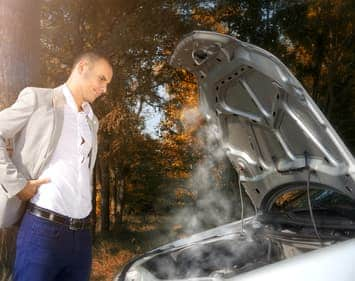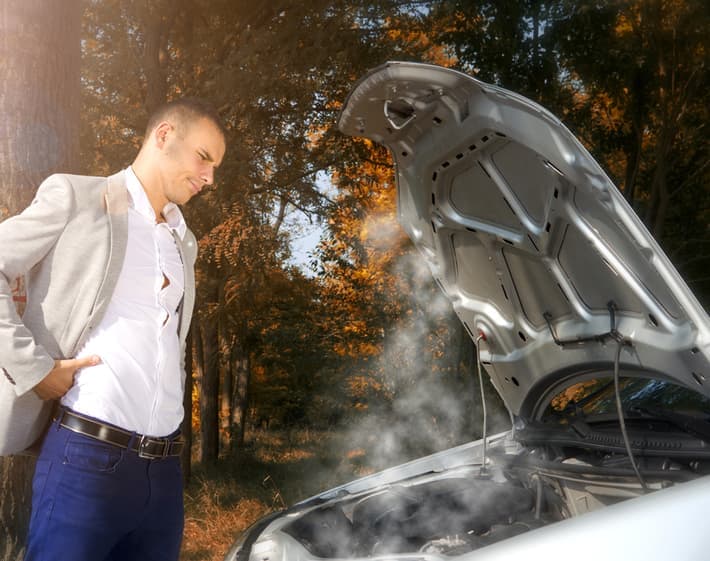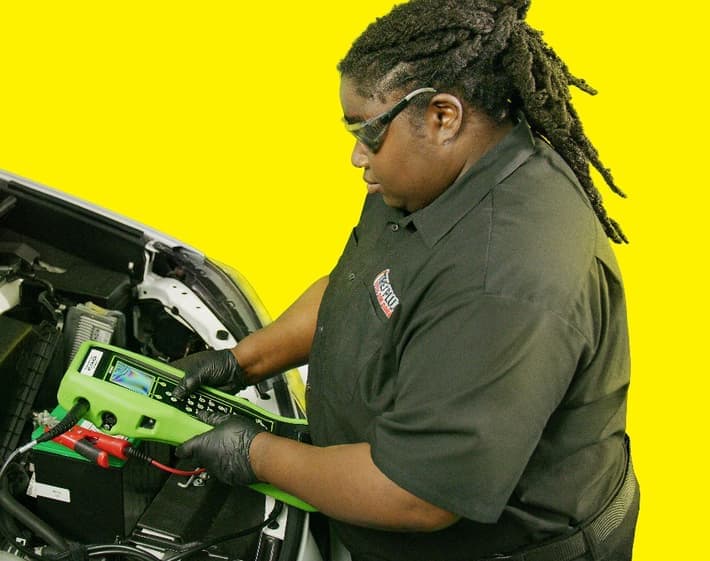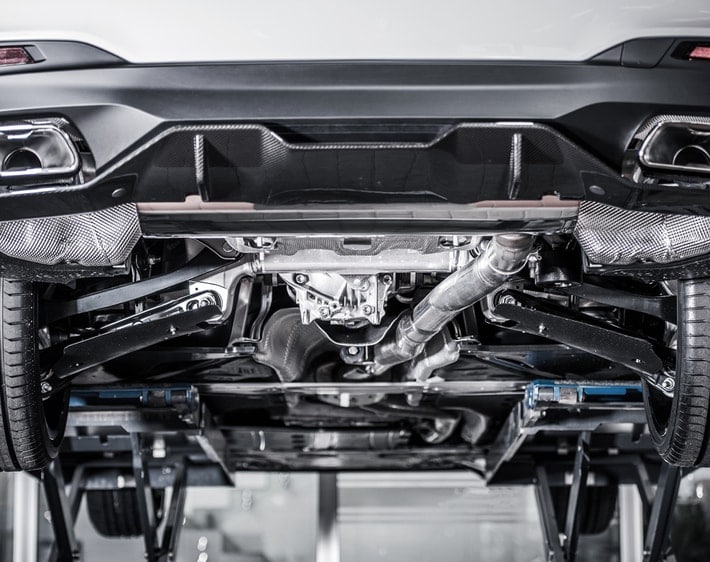 You've probably seen the unlucky driver on the side of the road with a smoking engine, flat tire, or dead car battery. And while you can't prevent every unfortunate event that can occur while driving, there are some things you can avoid with a little bit of preventative maintenance — that's why it's called, "preventative!" Learn about the most common car problems and what you can do to help keep them from happening to you.
You've probably seen the unlucky driver on the side of the road with a smoking engine, flat tire, or dead car battery. And while you can't prevent every unfortunate event that can occur while driving, there are some things you can avoid with a little bit of preventative maintenance — that's why it's called, "preventative!" Learn about the most common car problems and what you can do to help keep them from happening to you.
Flat Tires
The only thing worse than seeing a flat tire is realizing you have one once you’re already driving. That "ca-thunk-a-thunk" on the pavement means you either need to find an air station immediately or you’ll be waiting on roadside assistance. So, how can you prevent flats?
Check your tire pressure.
Maintaining proper tire pressure is essential to helping you avoid flat tires. Factors like cold weather can cause the air pressure in tires to fluctuate. Use a tire gauge to check each tire's PSI. Check your owner’s manual or the sticker on the driver's side door jamb for your manufacturer's recommended PSI level.
Add air to the tires as necessary to keep them from flattening, from prematurely wearing on the outside edges and sustaining possible damage from accidentally driving on flats. While checking each tire's pressure, inspect the tire for uneven tread wear, damage, cracks, or foreign objects that could lead to a flat.
Schedule regular tire rotations.
One good way to avoid a flat is to schedule regular tire rotations! Tire rotations can often be neglected, but they are one of the most important maintenance services for your vehicle. Rotations help ensure that your tire tread wears evenly, which can help lower the risk of tire bald spots, blowouts, and punctures.
Rotations also serve as a great reminder to visually inspect the condition of your tires to anticipate potential issues. Have your tires rotated every 3,000 to 5,000 miles or every time you get your oil changed. Schedule your next oil change and tire rotation service at your nearest Tires Plus, and our expert technicians can perform these services and more during your visit.
Overheating
Engines can overheat for several reasons, such as low coolant levels, radiator issues, a broken water pump, and blocked hoses. But no matter the cause, an overheating engine is a serious problem. If your engine is overheating, you may notice steam coming from under the hood, the engine temperature gauge spike, or a sweet or burning smell coming from the engine area.
If you're driving when these symptoms occur, pull over safely, turn off your engine, and let your car cool down. Continuing to drive with an overheating engine can cause further excess damage, so it's best to have roadside assistance get you to your nearest Tires Plus for immediate service.
Have your cooling system inspected.
The best way to prevent an overheating engine is to get your vehicle’s cooling system inspected and serviced regularly! During a cooling system inspection, a Tires Plus technician will examine your car’s radiator, cooling fans, heater core, hoses, water pump, and coolant, which enable them to make recommendations that help prevent your engine from overheating.
Depending on their findings, they may suggest minor services such as a coolant exchange or leak repair, or they may recommend a more extensive repair like replacing your system’s water pump. The key to minimizing the magnitude and cost of engine overheating-related services is to get your vehicle inspected before small issues turn into big problems.
Dead Car Battery
Car batteries have a finite lifespan that’s influenced by various factors like temperature, vibrations, electronic accessories, and usage. Car batteries can lose their cold cranking amps, especially in the winter months, leaving your car struggling to start.
Have your battery tested.
Help prevent a sudden dead car battery by having your battery checked regularly. During your next oil change, request that your Tires Plus technician check your vehicle's battery for the approximate remaining charge. While it won’t be a perfect countdown to the end of your battery’s reliable life, it’ll offer a great indication of when a new battery may be needed.
Clean your battery.
Corroded battery terminals may not always cause a dead battery, but they can certainly cause battery issues. Check your battery's positive and negative terminals for corrosion — corrosion may look like a white-green flaky substance around the battery posts and terminal connections. It's essential to clean corroded battery terminals to ensure your battery maintains a strong electrical connection.
If you are unsure how to clean your battery terminals, bring it to your local Tires Plus and request a Corrosion Protection Package. We will clean your battery terminals, terminal connectors and coat them with a specialized terminal protection spray.
Reduced Performance
Reduced performance is generally what happens if you don’t keep up with the manufacturer’s suggested scheduled maintenance. While it can be mild at first, the most common car problems you’ll see with reduced performance are:
- A loss of power
- Lower gas mileage
- The engine idling rougher
- The engine stalling
- Unfamiliar engine noises
Regularly change the oil and oil filter.
Make sure regular oil changes are a staple of your car maintenance checklist. Routine oil changes can help you avoid common engine problems and roadside repairs.
A minor oil leak can cause smoking or even a fire and, depending on where it is, it may also impact performance. If you suspect your vehicle is losing oil between oil changes, head to Tires Plus for oil leak repair services.
Get the spark plugs checked.
Faulty spark plugs can disrupt the fuel combustion process, leading to decreased engine performance. Some signs that may clue you into failing spark plugs include lackluster acceleration, decreased fuel economy, engine misfires, rough idling, or difficulty starting your engine. If you suspect your spark plugs need some attention, schedule a tune-up service at your local Tires Plus to have an expert technician replace the spark plugs as necessary.
Replace the engine air filter.
A dirty engine air filter can often cause similar issues as faulty spark plugs. The right amount of air must mix with the fuel in your vehicle's engine to ensure proper combustion. Make sure your engine is getting the right amount of air by having your engine air filter replaced as necessary.
Stay Ahead of Common Car Problems With Tires Plus
Whether your vehicle needs a routine oil change or maintenance checkup, Tires Plus has the right services to keep your car running smoothly all year long. Schedule a service appointment for preventative maintenance from your nearest Tires Plus, and our expert technicians will walk you through any necessary maintenance so you're not paying for services you don't need.



